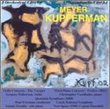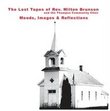| All Artists: Leopold Clam, Loren Driscoll, Martin Vantin, Patricia Johnson, Robert Koffmane, William Walther Dicks Title: Berg: Lulu; Wozzeck Members Wishing: 0 Total Copies: 0 Label: Deutsche Grammophon Release Date: 4/8/2003 Album Type: Box set Genres: Pop, Classical Styles: Vocal Pop, Opera & Classical Vocal, Historical Periods, Modern, 20th, & 21st Century, Symphonies Number of Discs: 3 SwapaCD Credits: 3 UPC: 028943570527 |
Search - Leopold Clam, Loren Driscoll, Martin Vantin :: Berg: Lulu; Wozzeck
 | Leopold Clam, Loren Driscoll, Martin Vantin Berg: Lulu; Wozzeck Genres: Pop, Classical
|
CD DetailsSimilar CDs |
CD ReviewsTwo masterworks from the years between the wars in a recordi Craig Matteson | Ann Arbor, MI | 10/16/2005 (4 out of 5 stars) "I remember when Schoenberg, Webern, and Berg were spoken of as the New Viennese School and compared to Haydn, Mozart, and Beethoven. Seriously. From our present standpoint, it is impossible to understand how much influence these three composers had in the mid-twentieth century. These two operas continue to be performed and through them Berg has become the most widely remembered of the three. Scholars have analyzed these works extremely closely and have discovered all kinds of symbolic patterns in the notes. For example, the music occurring around Marie as she dies seems rather chaotic, yet one scholar has shown that the music consists of ten fragments of music heard from and around her earlier in the opera. So, her life is passing before her as she dies. There is always a debate about how much of this deep meaning one can actually hear and it does vary for each listener. This kind of discussion goes on in all the arts, but is particularly so in music because it is the most abstract of the arts. How abstract and how removed from the surface can any "meaning" be and still be heard? This was a discussion we had many times in music school and I have met no more than a very few who convinced me they could actually hear this deeply (and this is more than recognizing a given row or its transformation or hearing the most fleeting tonalities in atonal works). For me, just as some of the ultra late romantic become somewhat over composed with a level of detail that seems to be there for its own sake, some of this minutiae is like going to a restaurant for a meal and being given an essay about a photograph of a painting of a pork chop. It may be interesting, informative, and even beautiful, but you still leave hungry. "Wozzeck" and "Lulu" are powerful and affecting works. They do sound much more like highly chromatic, but tonal works than the abstractions of Webern. "Lulu" is the more severe and, well, bleak of the two. I have heard more than a few praise these works for telling the truth about human life and getting to the true center of the human heart. To me, they seem more like artworks that were above all anti-bourgeois and seem proud of that stance. They seem to invoke not only the materialist views of the world of Marx, but also of Freud, and other now long forgotten apostles of deterministic thought. Is it possible to still see these works eighty years on as modern? They are as much prisoners of their time as are any other opera and less transcendent than I expect great works of art to be. Franz Wozzeck is a powerless man who has a child out of wedlock with a woman named Marie. He subjects himself to crackpot scientific experiments with a Doctor for a bit of extra money for Marie and their son. Marie feels oppressed by the social stigma of being an unwed mother, but also has eyes for other men. She is particularly attracted to a Drum Major who looks so wonderfully masculine, but is really a mere surface of a person. She has an affair with the Drum Major, which Wozzeck discovers. Since Wozzeck is already teetering on the edge of sanity from his impotence and the experiments, he falls off and stabs Marie after she tells him that she would rather be stabbed than beaten. He leaves her body and tosses the knife in a pond. Later, crazed even more deeply by guilt, he goes into the pond after the knife and drowns. The last moment of the play involves Marie's and Wozzeck's orphan at play and running off the stage oblivious that he is alone in the world. So, is this the true heart of us all? Is that last moment poignant, sharp irony on the human condition, or mere kitsch? I mean, dealing with the world view of this drama might benefit from as much detachment and irony as you can bring to it. "Lulu" is even harsher. She is married to a professor of medicine who has a heart attack when he sees her with a painter he has commissioned to paint her portrait. She marries the painter at the urging of another doctor, who is engaged to another, with whom Lulu has had a long term love affair (such as love is in this work). Finally, the doctor understands that the painter really is blind to Lulu's true nature and tells him of her past. He kills himself. Under threat the doctor marries Lulu. She then takes up with a Countess who is enamored of her. Lulu ends up killing him with a revolver he has given her. She is arrested and sentenced to prison. However, the countess arranges to take her place in prison to aid Lulu's escape. The Countess, the doctor's son, and an athlete help her escape abroad. Lulu then ends up with a wealthy man who ends up being a pimp and sells her to Cairo. While the opera was incomplete at Berg's early death at fifty, the outline and sketch let us know that she is living in London with the doctor's son and the athlete. When the Countess arrives without money, Lulu is reduced to becoming a streetwalker. She goes through a series of clients who are the musical reincarnations of her various husbands. One of them kills the doctor's son, and the last kills both Lulu and the Countess, since he is Jack the Ripper (!). The music is powerful and worth knowing because it is so personal to Berg and works its magic quite well. However, I have been at a symphonic concert when the Lulu Suite has been played and seem people get up and leave because they find it so harsh and intense. Berg was indeed a major composer of the twentieth century. He cannot be merely dismissed. If you want to understand the serious art of that century you must come to terms with these works. You don't have to love them, but you cheat yourself if you don't know them at least a bit. Certainly, the morality of these operas, shocking in their time, is roughly equal to the "normal" behavior in any two episodes of "Friends" and "Law and Order". So, it must be the music that continues to affect people so strongly. These recordings by Karl Böhm are masterfully done with great sound and solid singing. Some would prefer a different style of Sprechstimme (the half-singing) done here, but I find it appropriately chilling with the singing voice sliding around above the simultaneously sounding singing voice. I have no idea how it is done, but it sounds wonderfully insane." A classic Wozzeck/An outdated Lulu Craig Matteson | 05/26/2003 (5 out of 5 stars) "I received the LPs of both of these recordings in 1973 or 1974 for my birthday (I was 13 or 14 at the time), and I grew up loving them dearly (if can "love" such works). To this day, Dietrich Fischer-Dieskau will always be Wozzeck Gerhard Stolze will always be the Captain as far as I'm concerned. Unfortunately, the Lulu recording has been superseded by versions with Cerha's completion of the 3rd act (the best of which remains Boulez's classic 1979 [?] recording). But the entire set is worth it to get this classic Wozzeck." Classic Wozzeck from 60s clementi33 | Broward County, FL | 06/10/2003 (5 out of 5 stars) "I had this recording of Berg's "Wozzeck" in the 1960s. I think I was 14. I remember the performance as being one of the greatest I'd ever heard (of anything). I'd rank it with Furtwangler's "Tristan" (which knocked me out, also!) The singing of Evelyn Lear and Fischer-Deskau is magnificent; they have real chemistry, also, something rare in opera. A cast and performance made in heaven. Ranks with the Boulez version."
|

 Track Listings (28) - Disc #1
Track Listings (28) - Disc #1

